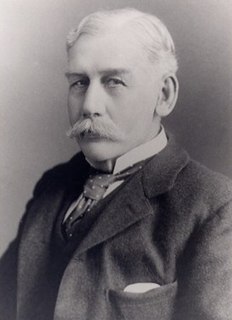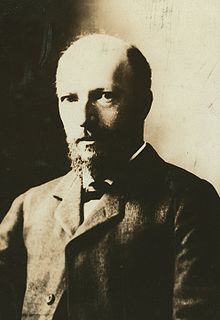Related Research Articles

George Edward Moore was an English philosopher. He was, with Bertrand Russell, Ludwig Wittgenstein, and Gottlob Frege, one of the founders of analytic philosophy. Along with Russell, he led the turn away from idealism in British philosophy, and became well known for his advocacy of common sense concepts, his contributions to ethics, epistemology, and metaphysics, and "his exceptional personality and moral character". Ray Monk later described him as "the most revered philosopher of his era".

Sidney James Webb, 1st Baron Passfield, was a British socialist, economist and reformer, who co-founded the London School of Economics. He was an early member of the Fabian Society in 1884, joining, like George Bernard Shaw, three months after its inception. Along with his wife Beatrice Webb and with Annie Besant, Graham Wallas, Edward R. Pease, Hubert Bland and Sydney Olivier, Shaw and Webb turned the Fabian Society into the pre-eminent politico-intellectual society in Edwardian England. He wrote the original, pro-nationalisation Clause IV for the British Labour Party.

Annie Besant was a British socialist, theosophist, women's rights activist, writer, orator, educationist, and philanthropist. Regarded as a champion of human freedom, she was an ardent supporter of both Irish and Indian self-rule. She was a prolific author with over three hundred books and pamphlets to her credit. As an educationist, her contributions included being one of the founders of the Banaras Hindu University.

Henry Sidgwick was an English utilitarian philosopher and economist. He was the Knightbridge Professor of Moral Philosophy at the University of Cambridge from 1883 until his death, and is best known in philosophy for his utilitarian treatise The Methods of Ethics. He was one of the founders and first president of the Society for Psychical Research and a member of the Metaphysical Society and promoted the higher education of women. His work in economics has also had a lasting influence. In 1875 he co-founded Newnham College, a women-only constituent college of the University of Cambridge. It was the second Cambridge college to admit women, after Girton College. Newnham College's co-founder was Millicent Garrett Fawcett. In 1856 Sidgwick joined the Cambridge Apostles intellectual secret society.

Frédéric Passy was a French economist and pacifist who was a founding member of several peace societies and the Inter-Parliamentary Union. He was also an author and politician, sitting in the Chamber of Deputies from 1881 until 1889. He was a joint winner of the Nobel Peace Prize in 1901 for his work in the European peace movement.

Bernard Bosanquet was an English philosopher and political theorist, and an influential figure on matters of political and social policy in the late 19th and early 20th centuries. His work influenced but was later subject to criticism by many thinkers, notably Bertrand Russell, John Dewey and William James. Bernard was the husband of Helen Bosanquet, the leader of the Charity Organisation Society.

Edward Caird was a Scottish philosopher. He was a holder of LLD, DCL, and DLitt.

Richard Lydekker was an English naturalist, geologist and writer of numerous books on natural history.

Felix Adler was a German American professor of political and social ethics, rationalist, influential lecturer on euthanasia, religious leader and social reformer who founded the Ethical Culture movement.

The Ethical movement, also referred to as the Ethical Culture movement, Ethical Humanism or simply Ethical Culture, is an ethical, educational, and religious movement that is usually traced back to Felix Adler (1851–1933). Individual chapter organizations are generically referred to as "Ethical Societies", though their names may include "Ethical Society", "Ethical Culture Society", "Society for Ethical Culture", "Ethical Humanist Society", or other variations on the theme of "Ethical".

Socialist Sunday Schools (SSS) were set up to replace or augment Christian Sunday Schools in the United Kingdom, and later the United States. They arose in response to the perceived inadequacy of orthodox Sunday schools as a training ground for the children of socialists and the need for an organised, systematic presentation of the socialist point of view to teach the ideals and principles of socialism to children and young people.

Stanton George Coit was an American-born leader of the Ethical movement in England. He became a British citizen in 1903.

Alfred Edward Taylor, usually cited as A. E. Taylor, was a British idealist philosopher most famous for his contributions to the philosophy of idealism in his writings on metaphysics, the philosophy of religion, moral philosophy, and the scholarship of Plato. He was a fellow of the British Academy (1911) and president of the Aristotelian Society from 1928 to 1929. At Oxford he was made an honorary fellow of New College in 1931. In an age of universal upheaval and strife, he was a notable defender of Idealism in the Anglo-Saxon world.

Henry Harvey Vivian was an English trade unionist, and Liberal Party politician and campaigner for industrial democracy and co-partnership, especially noted for his work in co-partnership housing.

The First Universal Races Congress met in 1911 for four days at the University of London as an early effort at anti-racism. Speakers from a number of countries discussed race relations and how to improve them. The congress, with 2,100 attendees, was organised by prominent humanists of that era; it was conceived of a result of comments in 1906 by Felix Adler and primarily executed by Gustav Spiller, a leader in the British Ethical Union. Philip Stanhope was president of the congress, and William Pember Reeves chaired its executive committee.

Clara Dorothy Bewick Colby was a British-American lecturer, newspaper publisher and correspondent, women's rights activist, and suffragist leader. Born in England, she immigrated to the US, where she attended university and married the former American Civil War general, later Assistant United States Attorney General, Leonard Wright Colby. In 1883, she founded The Woman's Tribune in Beatrice, Nebraska, moving it three years later to Washington, D.C.; it became the country's leading women's suffrage publication. She was an advocate of peace and took part in the great peace conference at San Francisco during the exposition. She also spoke on behalf of the soldiers of the Spanish War. During the Spanish–American War (1898), she was officially appointed as war correspondent, the first woman to be so recognized.
The International Moral Education Congress was an international academic conference held in Europe six times between 1908 and 1934. It convened because of an interest in moral education by many countries beginning a decade before the inaugural event. The movement for moral education had an ardent champion in the Ethical movement. The idea to hold the congress was at the behest of the International Union of Ethical Societies; its greatest proponents were Professor Friedrich Wilhelm Foerster and Gustav Spiller, the secretary of the Union. The first congress was held in 1908, and except for one 10-year beak (1912-1922), the congress met every four years in various cities. The official languages were German, English, and French.

John Howard Moore was an American zoologist, philosopher, educator and socialist. He advocated for the ethical consideration and treatment of animals and authored several articles, books, essays and pamphlets on topics including education, ethics, evolutionary biology, humanitarianism, utilitarianism and vegetarianism. He is best known for his work The Universal Kinship (1906), which advocated for a secular sentiocentric philosophy he called the doctrine of "Universal Kinship", based on the shared evolutionary kinship between all sentient beings.

Zona Vallance was a writer, lecturer, feminist, and key figure in the British Ethical Movement. As the inaugural Secretary of the Union of Ethical Societies, she held the equivalent role of today's Chief Executive.
Alice Mary Buckton (1867-1944) was an English educator, poet, community playwright, feminist and mystic.
References
- ↑ Ian Duncan MacKillop (1986). The British Ethical Societies. Cambridge University Press. p. 138. ISBN 978-0-521-26672-7 . Retrieved 14 January 2013.
- ↑ Ralph E. Luker (1991). Social Gospel in Black and White: American Racial Reform, 1885-1912. Univ of North Carolina Press. p. 312. ISBN 978-0-8078-4720-6 . Retrieved 14 January 2013.
- ↑ The Humanist: An Organ of the Ethical Movement, 1920, p.71